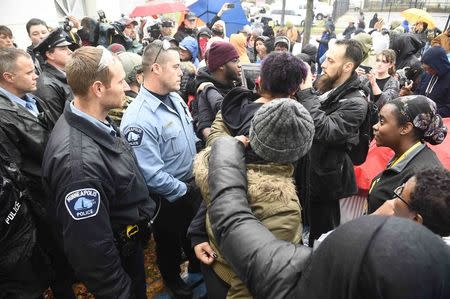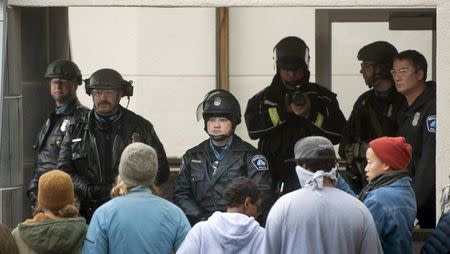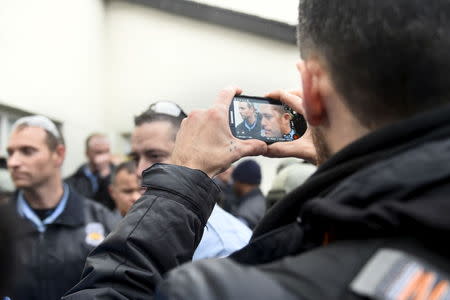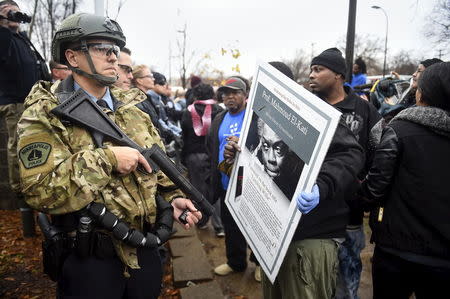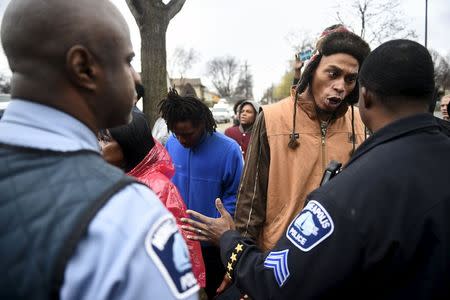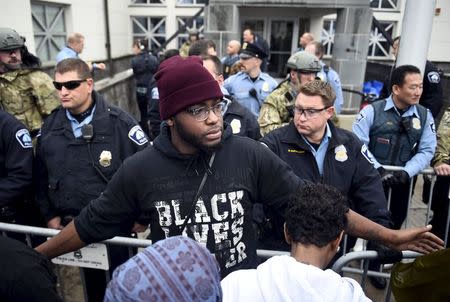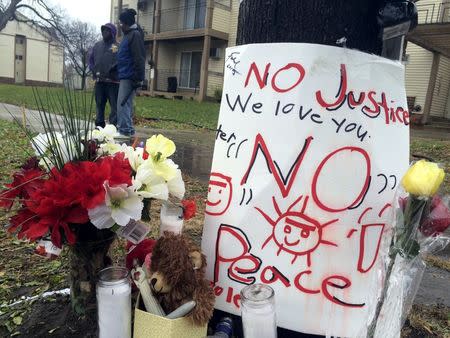Minneapolis shooting officers identified as protests rage
By Todd Melby MINNEAPOLIS (Reuters) - Minnesota officials on Wednesday identified the two Minneapolis police officers involved in the fatal shooting of an unarmed black man as chanting demonstrators surrounded a key police station. The Minnesota Department of Public Safety said Minneapolis Police Department Officers Mark Ringgenberg and Dustin Schwarze were involved in the shooting of Jamar Clark, 24, Sunday. Both men have been police officers for seven years, including 13 months with the city. The officers, whose race was not disclosed, are on administrative leave during an investigation. Clark is the latest in a series of unarmed black people to be killed at the hands of police in the United States over the past several years, fueling protests nationwide and rekindling a national civil rights movement. Attempts to reach the officers for comment were unsuccessful, and the union representing city police officers could not be reached. Community activists have said Clark was unarmed and handcuffed when he was shot shortly after midnight on Sunday. Officials confirmed Clark was unarmed but were still investigating whether he was handcuffed. Dozens of protesters have camped in front of the north Minneapolis precinct near where the shooting occurred, but on Wednesday police pushed them back from the entryway. Police said during a Wednesday news conference that demonstrators threw bottles, bricks and rocks at officers as they cleared the precinct entryway. "We will not tolerate property damage or any acts of violence against anyone. Public safety must continue to be our number one priority," Police Chief Janeé Harteau said. A growing crowd of at least 250 people, joining arms to partly surround the station, chanted slogans like "No justice, no peace. Prosecute the police," "Indict, convict, send those killer cops to jail" and "Handcuffs, don't shoot." About 20 officers, some wearing riot gear or dressed in fatigues, watched stoically from behind barricades police had set up. Minneapolis city council member Cam Gordon, who does not represent this ward but was present, said he would not have moved the demonstrators and worried about the potential for violence, while another city council member Lisa Bender said there was "a lot of fear in the crowd." Minneapolis Mayor Betsy Hodges called on the community to have patience with the investigation. "It is completely understandable to me that emotions are running high in the community," she said at the press conference. However, Pastor Brian Herron of Zion Baptist Church in Minneapolis criticized the police for coming out in riot gear. "We don't want another Ferguson," said the former city council member, referring to the St. Louis suburb where a white police officer's shooting last year of an unarmed black man and the decision by a grand jury not to indict the officer led to riots. "They are unleaching something they don't understand. Oh Lord." Clark was taken off life support on Monday evening, his family told local media. On Tuesday, the Hennepin County Medical Examiner's Office said Clark had died from a gunshot wound to the head at 9:25 p.m. CST Monday at the Hennepin County Medical Center. Officials with the Bureau of Criminal Apprehension (BCA), a unit of the Minnesota Department of Public Safety, have said it will give the results of its investigation to prosecutors in two to four months. A federal civil rights investigation is also underway. Late Monday, activists blocked the entrance of a police precinct following the shooting and marched to an Interstate highway, demanding authorities release video of the shooting. At least 50 people were arrested after blocking a section of Interstate 94 that runs through Minneapolis. Police officers had responded to a request for assistance from paramedics who reported that an individual was disrupting their ability to help an assault victim. The BCA said Clark was a suspect in the assault and that there was an altercation between him and the officers before one of them shot him. (Additional reporting by Ben Klayman in Detroit and Brendan O'Brien in Milwaukee, Writing by Ben Klayman; Editing by Jeffrey Benkoe and Christian Plumb)


